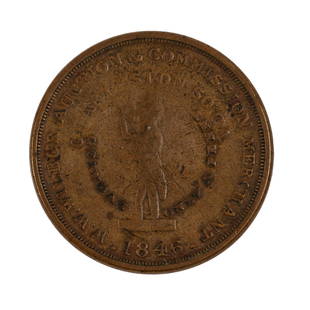
R. T. Paine 1780 Seizes Loyalist Vassall Estate, Prev. Used as G. Washington's HQ!
Similar Sale History
View More Items in Militaria & War MemorabiliaRelated Militaria & War Memorabilia
More Items in Militaria & War Memorabilia
View MoreRecommended Collectibles
View More





Item Details
Description
Massachusetts Seizes Loyalist Vassall Estate, Prev. Used as Washington's HQ
A legal document signed twice by Robert Treat Paine - first within the text as "Robert Treat Paine Esq." and then at the conclusion of the document as "RT Paine." 2pp (front and back), measuring 7.75" x 12.5", Boston, dated January [4th], 1780.Some of the text on verso has been crossed out, either by Paine himself or by another hand. With uneven moderate toning throughout. Flattened folds, which has led to some separations at the folds; some separations have been repaired. Chipping and minor paper loss at the edges, affecting only a small amount of text. Boldly signed by Treat.
The document was written by Paine as Attorney General for the Government and the People of the Massachusetts Bay and concerns the seizure of the estate of Loyalist John Vassall [spelled Vassal]. Paine lists several charges against Vassall, including "conspiracy to levy war", giving "Aid and Comfort" to the enemy, fleeing to Boston to "obtain the protection of the said Thomas Gage and of the said Forces", and ultimately abandoning his estate after departing for England. Paine goes on to assert that the estate should be seized by the State.
In part:
"John Vassal late of Cambridge…at Boston aforesaid since the nineteenth day of April anno Domini seventeen hundred & seventy five vist. on the twentieth day of the same April…levied War and conspired to levy War against the Government and People of this Province, Colony, and State and then and there adhered to the King of Great Britain, his Fleets, and Armies Enemies of the said Province, Colony, and State, and there and then did give to them Aid and Comfort…On the third day of September…and after the arrival of Thomas Gage Esq. late commander in chief of all his Britannic Majesties Forces in North America at Boston…did withdraw from Cambridge his usual place of habitation in this State into the said Town of Boston with the intention [paper loss] and obtain the protection of the said Thomas Gage and of the said Forces…" Paine goes on to recount how John Vassall retreated to other parts of the state under British control before fleeing to England. He then continues, "…the said John Vassal hat not since returned into any of the said United States and been received as a subject thereof. And that the said John Vassal by means of all and singular the offenses aforesaid hath freely renounced all civil and political relation to each and every of the United States and hath become an alien; and the said Attorney General further alleges that the said John Vassal since…was seized and possessed of and entitled to be seized and possessed of and to have demanded to his own use the following Message & Lands situate in Boston…"
The Vassall Estate had incredibly important value not only in association with the Revolutionary War but later with nineteenth-century American literature. The impressive Georgian-style mansion owned by Major John Vassall was built in 1759 in Cambridge, Massachusetts on what would come to be known as Tory Row, due to the number of houses built and owned by Loyalists. When the Revolutionary War broke out in 1774, Vassall and his wife, who was the sister of the royal lieutenant governor of Massachusetts, Lt. Governor Thomas Oliver, fled to Boston. Thomas Oliver also married Vassall's sister, Elizabeth, so they were, in fact, double brothers-in-law. Vassall and his family eventually left for England, and their abandoned mansion became the headquarters of General George Washington from July 1775 to April 1776, during the Siege of Boston.
When the Vassalls abandoned their house, they also abandoned several of their enslaved servants, including Tony and Cuba Vassall and their six-year-old son, Darby. It is believed that Washington offered to employ the boy upon learning Vassall “belonged to the place,” but when Darby asked for a wage, Washington thought compensation to be unreasonable. Later in life, Darby Vassall remarked that Washington was “no gentleman, [wanting a] boy to work without wage.” In 1780, when the Massachusetts General Court authorized the seizure of properties abandoned by Loyalists (as seen in this document), Tony and Cuba Vassall faced eviction from the property. They petitioned the General Court to be allowed to remain on their small portion of the estate and to continue cultivating an acre of land. That petition was sadly denied, but they were successful in gaining their second petition made in 1781. Tony Vassall was granted twelve pounds annually, but their good fortune would be short, as the family was evicted later that same year.
After the war, the house came into the possession of Andrew Craigie, who had been the Continental Army’s first Apothecary General. When he died, he left his wife with numerous debts, and she was forced to take in boarders to make ends meet. Over the next two decades, she took in many boarders, including several Harvard students. One such tenant was Henry Wadsworth Longfellow, then a professor of modern languages at Harvard, who took up residence in In 1837. When Longfellow married Fanny Appleton in 1843, her father acquired the house to give the newlyweds as a wedding gift. Longfellow would live there until his death in 1882. The house fell to his daughter, Alice Longfellow, who helped establish the Longfellow House Trust to preserve the house as a monument to their father and George Washington. In 1962, the house became a National Historic Landmark and it was donated to the National Park Service. Today it is open to the public as the Longfellow National Historic Site.
This item comes with a Certificate from John Reznikoff, a premier authenticator for both major 3rd party authentication services, PSA and JSA (James Spence Authentications), as well as numerous auction houses.
WE PROVIDE IN-HOUSE SHIPPING WORLDWIDE!
Buyer's Premium
- 25%
R. T. Paine 1780 Seizes Loyalist Vassall Estate, Prev. Used as G. Washington's HQ!
Shipping & Pickup Options
Item located in Wilton, CT, usPayment

Auction Curated By










































![[Civil War] General Orders For the Years 1862, 1863 & 1864, Including Preliminary Emancipation: Civil WarWashington, D.C., ca. 1863-1865[Civil War] General Orders For the Years 1862, 1863 & 1864, Including Preliminary Emancipation ProclamationBooksThree rare Civil War General Orders volumes for](https://p1.liveauctioneers.com/6306/327579/176471829_1_x.jpg?height=310&quality=70&version=1714074043)

















![George Washington Signed Discharge: Partly printed discharge document signed by George Washington, as Commander in Chief of the Armies of the United States. Newburgh, [New York], 4 January 1783. 1 page, ## x ## in. Undersigned by Washin](https://p1.liveauctioneers.com/7226/322253/173251475_1_x.jpg?height=310&quality=70&version=1710004847)
![Captured Bowie Knife w/ Period Note of Provenance: Captured Confederate D-hilt Bowie knife. [Kenansville, North Carolina]: [Louis Froelich factory]. With original metal and leather sheath with affixed period notes. First note with only remnants. Secon](https://p1.liveauctioneers.com/7226/325455/175169154_1_x.jpg?height=310&quality=70&version=1712370394)
![[Ambrotype] Texas Confederate Soldier: Sixth plate ambrotype. Full leatherette case. Portrait of a possible Texas Confederate soldier. A silver star device was used to pin up the brim of his light-toned headgear, a look often seen in image](https://p1.liveauctioneers.com/7226/322253/173251509_1_x.jpg?height=310&quality=70&version=1710004847)
![[Civil War] Bullet Which Nearly Killed Soldier: Lead bullet encased in gold acorn fob with chain. Finely engraved: "W.D. Fiske / 14th Regt. C V / Fredericksburg / Dec 17, 1863." Acorn approx. 1 1/2 x 1 in. Overall length 6 1/2 in. Published in "Her](https://p1.liveauctioneers.com/7226/325455/175169103_1_x.jpg?height=310&quality=70&version=1712370394)

![[CIVIL WAR] 1st Texas Infantry in Camp: Outdoor half plate ambrotype of the 1st Texas Infantry. Full leatherette case. Significant, large half plate ambrotype of members of the 1st Texas Infantry at ‘Splinterville,’ the regiment’s win](https://p1.liveauctioneers.com/7226/322253/173251512_1_x.jpg?height=310&quality=70&version=1710004847)
![[HANCOCK, John] Washington’s Spy, Officer’s Commission: Partly printed document signed by John Hancock as President of the Continental Congress, for Epaphras Bull (1748-1781). [Philadelphia, Pennsylvania], 10 January 1777. 1 page, ## x ## in. Completed in](https://p1.liveauctioneers.com/7226/322253/173251471_1_x.jpg?height=310&quality=70&version=1710004847)
![[CIVIL WAR] Black Soldier & Wife: CDV-sized tintype photograph WITH gem-sized tintype. Full thermoplastic case. Portrait of an unknown African American Civil War soldier who holds the rank of sergeant. He looks directly at the camera](https://p1.liveauctioneers.com/7226/322253/173251671_1_x.jpg?height=310&quality=70&version=1710004847)
![Historic Einstein Signed Program from Lincoln University Visit: Conferences on Objectives. Lincoln University, [Oxford], Pennsylvania, 3 May 1946. SIGNED BY ALBERT EINSTEIN. Tipped into Horace Mann Bond (1904-1972). The Education of the Negro in the American Socia](https://p1.liveauctioneers.com/7226/322253/173251693_1_x.jpg?height=310&quality=70&version=1710004847)
![[Civil War] Cavalry Regiment's Colors : Regulation Civil War Cavalry Regimental flag, c. 1861-1865. Hand-painted and gilded on silk. Approx. 34 x 31 inches. Trimmed on three sides with gold silk fringe. Extremely fine Federal regulation han](https://p1.liveauctioneers.com/7226/325455/175169108_1_x.jpg?height=310&quality=70&version=1712370394)










